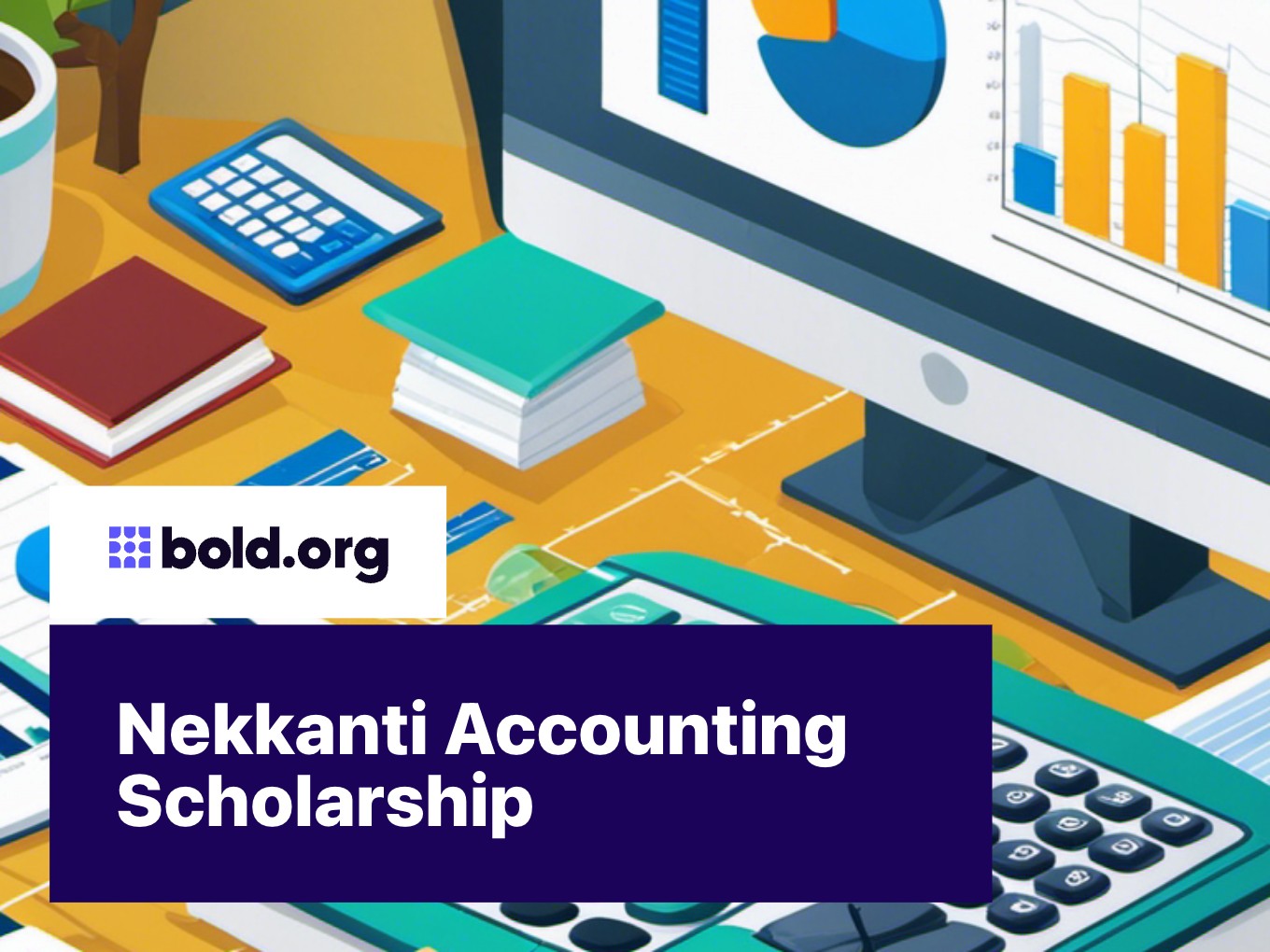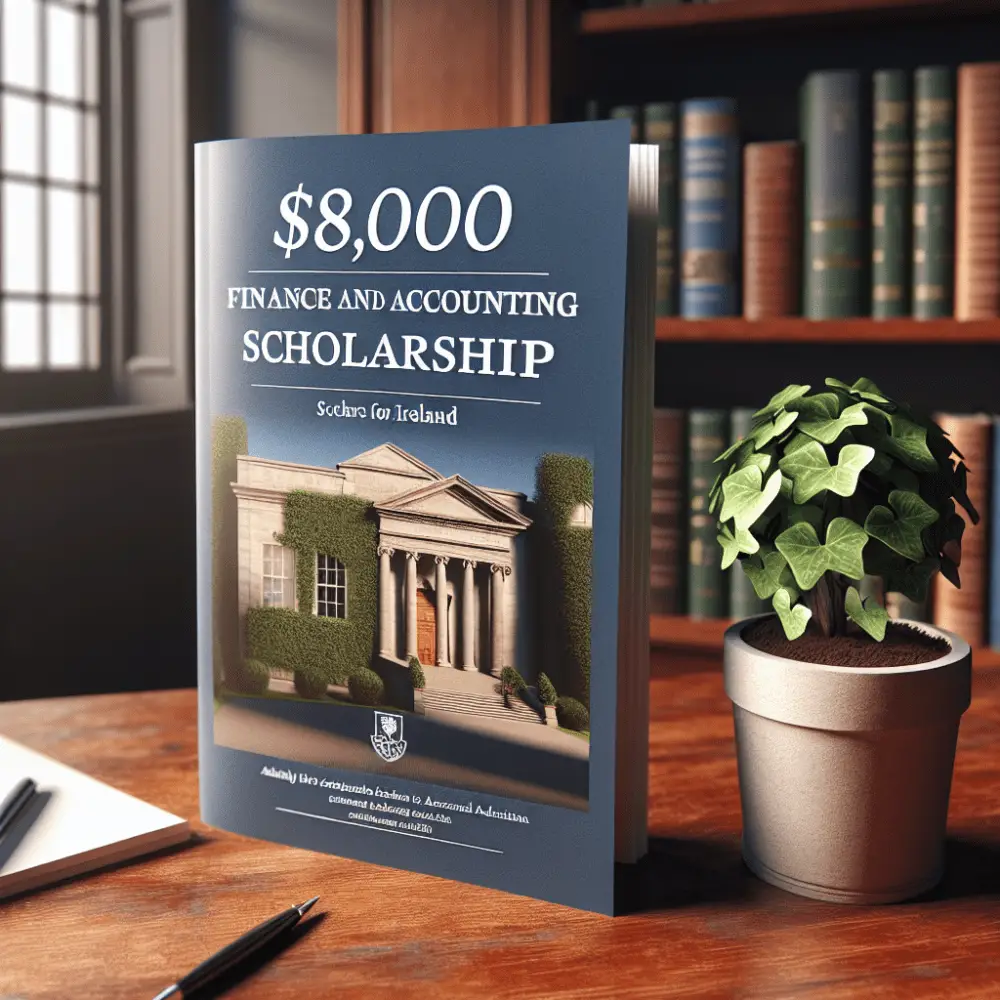
Unlocking Your Future: My Personal Guide to Securing Accounting Scholarships
I remember standing at the precipice of my college dream, a mix of excitement and cold dread washing over me. The excitement was for the world of numbers, logic, and financial insight that accounting promised. The dread? That came from the astronomical figures staring back at me from the university tuition pages. My family wasn’t wealthy, and the idea of piling on student loan debt before even starting my career felt like a crushing weight. I truly believed I was good at math, had a knack for organization, and could thrive in the accounting field, but how was I ever going to afford it? This feeling, I’ve learned, is a common one for so many bright minds eyeing a career in accounting.
For a while, I just saw a wall. A really, really tall, expensive wall. But then, a flicker of hope appeared in a casual conversation with an older cousin who had just graduated. "Scholarships," she said, as if it were the most obvious thing in the world. I’d heard the word, of course, but it always sounded like something reserved for Nobel Prize winners or Olympic athletes – not for someone like me, just trying to make sense of debits and credits. Little did I know, that single word would become the key to unlocking my entire academic and professional journey.
This isn’t just about money; it’s about opportunity. Scholarships aren’t just handouts; they’re investments. Investments in your potential, your drive, and your future contributions to the world of business. They tell you, "We believe in you." And that belief, let me tell you, is worth more than any dollar amount.
My journey to securing accounting scholarships wasn’t a straight line. It was filled with late nights, endless essays, a fair share of rejections, and moments of doubt. But it was also incredibly rewarding, teaching me resilience, how to articulate my aspirations, and the power of persistence. Now, years later, having navigated that path, I want to share everything I learned with you, in the hope that it makes your own journey a little clearer, a little less daunting, and a lot more successful. Think of me as your guide, sharing the map I wished I had when I first started.
Why Accounting? And Why Funding Matters So Much
Before we dive into the nitty-gritty of how to find and win these scholarships, let’s briefly touch on why accounting is such a fantastic field. It’s often seen as the language of business, providing stability, diverse career paths, and generally excellent earning potential. From forensic accounting to auditing, taxation, financial planning, and even entrepreneurship, an accounting degree opens so many doors. But getting that degree requires a significant investment of time and, crucially, money.
That’s where scholarships come in. They reduce the financial burden, allowing you to focus on your studies instead of worrying about how you’ll pay for them. They also often come with networking opportunities, mentorship, and a stamp of approval that looks fantastic on your resume. So, if you’re passionate about numbers, problem-solving, and making a real impact in the business world, know that there are people and organizations out there ready to help you fund that dream.
Where to Even Begin Looking: The Scholarship Scavenger Hunt
When I first started, my search was scattershot. I typed "accounting scholarships" into a search engine and was immediately overwhelmed. It felt like trying to find a needle in a haystack made of other needles. The trick, I soon learned, is to be strategic and look in several key places.
-
Your University’s Financial Aid Office: This is always your first port of call. Seriously, walk in there, talk to a human being. They have access to institutional scholarships that are often only available to students enrolled at their specific university. These might be departmental scholarships for accounting majors, or broader university-wide awards. They can also tell you about specific deadlines and requirements unique to your school. Don’t just browse their website; engage with them directly. I found one of my first scholarships this way – a modest but incredibly helpful award specifically for students entering the business school with a declared accounting major.
-
Online Scholarship Search Engines: These are fantastic resources, but they require patience and diligence. Think of sites like Fastweb, Scholarship.com, Chegg Scholarships, or even BigFuture by College Board. You create a profile, input your academic information, interests, demographics, and intended major, and they match you with relevant scholarships. The key here is to be thorough with your profile. The more information you provide, the better the matches will be. Be prepared to sift through many options, some of which might not be a perfect fit, but the gems are there.
-
Professional Accounting Organizations: This is a goldmine for accounting students. Organizations like the AICPA (American Institute of Certified Public Accountants), the IMA (Institute of Management Accountants), and various state CPA societies (e.g., the California Society of CPAs, the New York State Society of CPAs) all offer scholarships. These organizations are deeply invested in the future of the profession, and they put their money where their mouth is. Their scholarships often come with the added benefit of networking events and mentorship opportunities, which are invaluable. I specifically remember applying for an AICPA scholarship and, even though I didn’t win that particular one, the application process itself connected me with some amazing resources.
-
Accounting Firms (Especially the "Big 4" and Regional Firms): Many accounting firms, from the giant Big 4 (Deloitte, EY, PwC, KPMG) to large regional firms and even smaller local practices, offer scholarships. Why? Because they’re looking for future talent. These scholarships often come with internships, which are an incredible foot in the door for your career. Check their career pages; they usually have sections dedicated to student programs and scholarships. This is where demonstrating your enthusiasm for the field, even as an undergraduate, can really pay off.
-
Local Community Foundations and Organizations: Don’t overlook your own backyard! Community foundations, Rotary Clubs, Kiwanis Clubs, local chambers of commerce, and other civic groups often offer scholarships specifically for students from their area. These can be less competitive simply because fewer people know about them or bother to apply. I found a small but significant scholarship through my local Rotary Club, which was a wonderful surprise and showed me that opportunities can pop up in unexpected places.
-
Employers (Yours or Your Parents’): Some companies offer tuition assistance or scholarships to employees or their children. It’s worth asking around. You never know what benefits might be available.
Understanding the Different Flavors of Scholarships
Not all scholarships are created equal, and understanding the different types can help you tailor your search and applications.
-
Merit-Based Scholarships: These are awarded based on academic achievement – your GPA, test scores (SAT/ACT), extracurricular activities, leadership roles, and sometimes even specific skills or talents. If you’ve got a strong academic record, this is where you’ll shine. My decent high school GPA and involvement in my school’s debate club helped me secure several merit-based awards from my university.
-
Need-Based Scholarships: These are awarded based on your financial situation. You’ll typically need to fill out the Free Application for Federal Student Aid (FAFSA) in the U.S. to determine your Expected Family Contribution (EFC). Many universities and some private organizations use this information to assess your need. Don’t assume you won’t qualify; always fill out the FAFSA! Even if you think your family earns too much, you might be surprised by what you’re eligible for.
-
Demographic/Identity-Based Scholarships: Many scholarships are specifically for students from certain backgrounds – minority groups, women in STEM (or business fields like accounting), first-generation college students, students with disabilities, or those from specific geographic regions. These are crucial for promoting diversity and inclusion within professions. I saw many scholarships aimed at encouraging women to enter accounting, which was inspiring.
-
Major-Specific Scholarships: As we’ve discussed, many scholarships are specifically for accounting majors. These are often offered by universities, professional organizations, or accounting firms. They want to cultivate talent directly related to their field. This is your sweet spot!
-
Corporate Scholarships: Beyond accounting firms, many large corporations offer scholarships, sometimes related to their industry, sometimes broader. For instance, a major bank might offer scholarships to business students, including accounting majors.
-
Essay-Based Scholarships: Some scholarships weigh your written essay very heavily, or even exclusively. These often require you to answer a specific prompt, demonstrating your passion, creativity, and writing skills. These were often the most challenging but also the most rewarding for me, as they allowed me to truly tell my story.
Crafting Your Application: More Than Just Filling Out Forms
Once you’ve found scholarships that seem like a good fit, the real work begins. An application isn’t just a collection of documents; it’s your opportunity to tell your story, to show them why you are the best investment.
-
The Transcript: Your Academic Story: This is straightforward. Keep your grades up! Most scholarships will ask for your official transcripts. For accounting scholarships, a strong performance in math and business-related courses will naturally stand out.
-
Letters of Recommendation: Your Advocates: This is where building relationships with your teachers, professors, and mentors pays off. Don’t just ask anyone; ask someone who knows you well, who can speak to your character, your work ethic, and your potential. When you ask, do it politely and well in advance of the deadline. Provide them with everything they need: your resume, the scholarship requirements, and a brief explanation of why you’re applying and what you hope to achieve. Make it easy for them to write a glowing letter. I remember feeling nervous asking my calculus professor, but he was thrilled to help and wrote a fantastic letter emphasizing my analytical skills.
-
The Resume/CV: Your Professional Snapshot: Even if you don’t have extensive work experience, your resume should highlight your academic achievements, leadership roles (student clubs, sports), volunteer work, and any relevant skills (e.g., proficiency in Microsoft Excel, basic coding, language skills). Tailor it for each application if possible, emphasizing experiences that align with the scholarship’s criteria or the accounting field. Did you manage the budget for a school event? That’s accounting experience!
-
The Essay: Your Voice, Your Passion: This is arguably the most critical part of many applications. This is where you connect with the scholarship committee on a human level.
- Understand the Prompt: Read it carefully. What are they truly asking? Don’t just repurpose an old essay; make sure it directly addresses the question.
- Tell Your Story: Why accounting? What sparked your interest? Was there a specific moment, a person, or an experience that drew you to the field? Share that. Authenticity is key. My essays often talked about how I loved solving puzzles and how accounting felt like the ultimate business puzzle.
- Show, Don’t Just Tell: Instead of saying, "I am a hard worker," describe a time when you demonstrated perseverance. Instead of "I love numbers," explain how you used quantitative skills in a project or a personal situation.
- Future Goals: How will this scholarship help you achieve your career aspirations in accounting? Be specific. Do you want to become a CPA, work in forensic accounting, or help small businesses thrive?
- Proofread, Proofread, Proofread: A sloppy essay with typos immediately signals a lack of attention to detail – not a great trait for an aspiring accountant! Have multiple people read it over. I always asked my English teacher and a friend to review mine.
-
Interviews: Some scholarships, especially larger ones or those tied to firms, might require an interview. Treat it like a job interview. Research the organization, practice answering common questions ("Why accounting?", "What are your strengths/weaknesses?", "Where do you see yourself in five years?"), and prepare a few questions to ask them. Dress professionally, be polite, and let your enthusiasm shine through.
My Hard-Earned Tips for Scholarship Success
After countless applications and a few victories, I developed a rhythm and some strategies that I believe significantly improved my chances.
-
Start Early, Stay Organized: Seriously, this is non-negotiable. Scholarship deadlines sneak up on you. Create a spreadsheet or a dedicated notebook. List the scholarship name, organization, deadline, requirements, and status (applied, essay drafted, waiting for recommendation, etc.). This keeps you sane and ensures you don’t miss opportunities. I started my scholarship search a full year before I planned to attend college.
-
Apply for Many, Not Just a Few: It’s a numbers game. Not every application will result in an award. The more quality applications you submit, the higher your chances of success. Don’t get discouraged by rejections; they’re part of the process. I probably applied for over 50 scholarships in my first year alone.
-
Tailor Each Application: While you can reuse parts of essays or resumes, never submit a generic application. Always tweak your essay and highlight experiences that are most relevant to that specific scholarship. Committees can spot a copy-paste job a mile away.
-
Show Your Personality (Appropriately): Committees want to fund real people, not robots. Let your unique voice and passion come through, especially in your essays. What makes you, you? What unique perspective do you bring to the table?
-
Network, Network, Network: Attend career fairs, accounting club meetings, and professional events. The people you meet – professors, professionals, alumni – can become valuable resources for advice, mentorship, and even leads on scholarships. Sometimes, just having a connection can make a difference. I got a tip about a local scholarship from a CPA I met at a university career event.
-
Don’t Discount "Small" Scholarships: A $500 scholarship might not seem like much, but a few of those add up quickly! And often, smaller scholarships have fewer applicants, making them less competitive. Every little bit helps.
-
Follow Instructions Meticulously: Read every single instruction carefully. Missing a deadline, failing to include a required document, or not adhering to word limits can get your application tossed out immediately, no matter how brilliant you are.
-
Be Gracious: If you win a scholarship, send a thank-you note. It’s not just good manners; it reinforces your professionalism and can open doors for future opportunities or connections.
Beyond the Money: The Hidden Benefits
Winning a scholarship isn’t just about the financial relief, although that’s certainly a huge part of it. It brings a host of other benefits that truly enhance your academic and early career journey.
Firstly, it’s a huge confidence booster. Knowing that an organization believes in your potential enough to invest in you is incredibly empowering. It validates your hard work and motivates you to keep striving for excellence. I felt a surge of pride every time I received a scholarship notification; it made all the effort feel worthwhile.
Secondly, many scholarships, particularly those from professional organizations or firms, come with invaluable networking opportunities. You might be invited to exclusive events, meet industry leaders, or be assigned a mentor. These connections can be pivotal for internships, job placements, and future career growth. My first internship came about directly because of a connection I made through a scholarship award ceremony.
Thirdly, having scholarships on your resume is a strong indicator of your capabilities and drive. It tells future employers that you are not only academically strong but also proactive, resourceful, and recognized for your potential by external bodies. It sets you apart from other candidates.
Finally, the process itself teaches you critical life skills: research, organization, persuasive writing, interview techniques, and resilience in the face of rejection. These are skills that will serve you well, not just in college, but throughout your entire professional life.
My Parting Words of Encouragement
Embarking on the scholarship search can feel like a daunting task, especially when you’re already juggling academics, work, and personal commitments. There will be moments of frustration, moments where you feel like giving up. I certainly had them. But I want to assure you, from someone who has been there and navigated that very path, it is absolutely worth every ounce of effort.
The investment you make in applying for scholarships is an investment in your future self. It’s about reducing debt, opening doors, and gaining recognition that will propel your accounting career forward. Don’t let the fear of the unknown, or the sheer volume of options, deter you. Start small, stay persistent, and believe in your potential.
Your journey to becoming an accountant, a financial expert, or a business leader is within reach. And with the right approach to scholarships, you can build a solid foundation without the crushing burden of excessive student debt. Take that first step. Open that spreadsheet. Write that first essay. Your future self will thank you. Good luck, and may your journey be filled with success!


